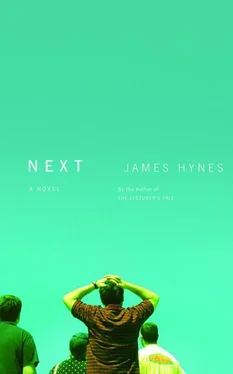“Pardon?”
“Firesign Theatre.” Kevin waves it away. “Forget it.”
They sit for a moment in silence, and Kevin feels the Texas heat closing in around him again, hears the traffic beyond the fence. “Rock Lobster” is replaced in his head by another rhythmic pop song in Spanish from the tinny loudspeaker.
“So what happened after that?” says Claudia.
“Oh,” says Kevin, “I started seeing this other girl that summer, someone I didn’t actually, you know, love. And who didn’t love me, either, but that was okay.”
Lynda à la plage, Lynda on the railing. No way he’s telling Dr. Barrientos the second half of the story. He’s told her what the Philosopher’s Daughter said, how it set up a vibration in him that he still feels a quarter-century later, but no way he’s telling her about Lynda on the Philosopher’s Daughter’s front porch.
“No,” says Dr. Claudia. “I mean right then, at the party, on the porch. What happened next?”
“Oh.” In the flexing embrace of the flimsy plastic chair, Kevin runs his palm over his sweaty forehead and hair. “I really don’t remember. We probably went back inside and danced some more, I don’t know. It was kind of like the moment right after an explosion, my ears were ringing, I couldn’t really hear or see anything. I honestly don’t remember.”
He’s feeling calm now, calmer than he’s felt all day, actually. Calmer than he’s felt in weeks, even, since before he found Stella’s pregnancy test in the kitchen trash. You put a moment like that in the context of a lifetime, and it’s not such a big deal. Makes him wonder why he’s been so fretful about it. Makes him wonder why he’s in Texas at all.
“Why’d she tell me that, though,” he hears himself say, “when I asked her not to? That’s what I still don’t get. That’s what I still can’t get my mind around after all this time. Maybe she was just being cruel to be kind, telling me what she thought I needed to know so that I wouldn’t embarrass her again. A girl like that, I’m sure she had guys throwing themselves at her all the time. In fact, I know she did. Like I say, half the guys I knew…”
He thinks of her name, even as her face fades into the glare leaking through the leaves of the tree over the courtyard.
“I mean, she must have felt constantly besieged, and I’m sure she did her best to deflect all that uninvited interest as nicely as possible, because she wasn’t a bad person, or mean, or bitchy. It’s just that she must have gotten tired of all that… longing coming at her, all the time. So she learned to cut to the chase, say just the right thing that would stop the latest lovesick bastard in his tracks.”
Now he just feels tired. He wishes he could go somewhere and lie down. Even Lynda’s face is hard to recall now.
“But you know,” Kevin says, “that thing she said? What she told me about myself? It wasn’t exactly helpful. In fact, if you want to know the truth, it feels like a curse. I’ve never forgotten it, and it’s always there, at the back of my mind. Especially when I’m with a woman I love, or think I love. Or think I want to love. It’s like a leash, with the Philosopher’s Daughter at the other end. If I try too hard with a woman, if I make the effort, then I feel this little tug, like, not so fast, buster, who do you think you’re kidding?”
“Ah,” says Claudia.
“Because here’s the thing.” Kevin leans forward, rocking the table again. “Even it wasn’t true when she told me, it’s been true ever since because she told me.”
In the time they’ve been sitting there, a few more people have settled at tables in the courtyard. Some of them are already eating, so somewhere along the way the loudspeaker has announced more numbers, and Kevin just hasn’t heard them. A black bird is goose-stepping to and fro on a tabletop close to Kevin and Claudia’s, eyeing their half-finished tacos, first with one unblinking eye and then the other. In the heat under the tree Kevin and Claudia look at each other across the table as if they have each only just realized the other person is there. Their silence is no longer like a first date, but like the silence at the end of a break-up, when there’s nothing more left to say. Kevin doesn’t feel embarrassed or exposed or angry, just spent. Now what? he thinks. What’s next?
“Shall we go?” says Dr. Barrientos.
Out on Lamar again, in the hot cab of the truck, Claudia lowers the side windows a few inches, which lets out the heat and lets in a wedge of midday glare from either side.
“Just till the AC blows cold,” she says, though Kevin can already feel the difference from a vent as it plays over the rip in his trouser leg. His jacket folded again on his lap, Kevin gazes dully through the windshield at South Lamar finishing its slow, sinuous climb up from the river. As the glaring sky opens out above the street, Kevin sees a large church with a vast yellow lawn and a diner with a big neon coffee cup and more scruffy garages and bottom-rung car dealers, but he barely registers them. He feels numb and hollowed out by his exchange of intimacies with Dr. Barrientos, as if he’s just survived a loud explosion and is struggling to form a coherent thought in the reverberating silence. But all he can hear is tenderness and passion, tenderness and passion —oddly enough, though, not in the Philosopher’s Daughter’s own midwestern pixie’s intonation, but in the slightly nasal drawl of her lanky father, the professor himself, from whom Kevin took a class in ethics and who reminded Kevin of Jimmy Stewart. In fact, over the course of the semester, the professor managed to embody not one, but several avatars of Jimmy Stewart: narrating the death of Socrates as if it were the last reel of Mr. Smith Goes to Washington; explaining utilitarianism as if he were the flinty, selfless technician of Strategic Air Command; and throughout the semester eyeing with barely repressed longing, as if he were the embittered sexual obsessive of Vertigo, a pair of ripe and stylish Southfield girls who always sat together in cashmere sweaters in the front row. So much did the professor remind Kevin of the actor, down to stammering and widening his eyes and waving his big-fingered hands when he was excited, that now, as the professor lectures Kevin about tenderness and passion — which he never did in real life — Kevin can’t really picture the Philosopher’s Daughter’s father at all, but sees instead the graying, middle-aged, parentally befuddled Stewart of the late-career comedies, flying off to Paris to rescue his teenaged daughter from some dreamy French boy, or his teenaged son from Brigitte Bardot, or even the professor’s own, real, vixenish daughter from some passionless son of Royal Oak.
“Duh, duh, de fine your terms, son,” stammers Professor Stewart. “Wha, wha, what do you mean by tenderness and passion?”
I have no idea! Kevin wants to shout. I can’t define them. To define them would be to pin them like butterflies to a corkboard. And anyway, professor, according to your own daughter, my problem isn’t that I can’t define them, it’s that I can’t express them. Besides, what do tenderness and/or passion get you? When Stella wakes up crying in the middle of the night, he holds her tightly until she stops shuddering. Neither of them says a word, they just clutch each other in the dark until she’s breathing evenly again. Then he loosens his grip but doesn’t let go of her completely. In the morning they never speak of it. What has his tenderness accomplished?
And passion, what of it? The Other Kevin, the Jihadist Kevin, the Freckled Suicide Bomber, he was passionate, wasn’t he? How many people died because of his passion? The Other Kevin’s blurry martyrdom video has been running nonstop on CNN and Fox all weekend, perhaps because it’s one of the rare examples performed in English. And even then they’ve been running it with subtitles, because Kevin/Abdul — posing in a green headband before a grainy blow-up of Osama bin Laden — speaks of jihad in an incomprehensibly thick Glaswegian monotone. Without the subtitles Kevin — Quinn, not MacDonald — would understand only every third or fourth word. Yeah, young Kevin was one confused, inarticulate young bastard, but at least he believed in something, didn’t he? At least he was willing to die for something. What would I be willing to die for, wonders Kevin — the decent Kevin, not the murderous Kevin — anything? Who would I be willing to die for? The Philosopher’s Daughter? That would have been a waste, she didn’t want me anyway. Lynda? Don’t be stupid, that wasn’t passion. Beth? Would he have died for her? Would he have died for her when she was pregnant with another man’s child? Say they were in a public place — the aisles of Gaia, say — and say Kevin saw some nervous-looking young guy suddenly open his overcoat to reveal a canvas vest bulging with plastic explosives, and say the guy started yelling Allahu akbar or whatever — would Kevin throw himself between Beth and her unborn child and the bomber? Probably, but that might just be good manners. In that last instant before everything went black, Kevin would feel like a chump. He’d be thinking, it’s not even my kid. And what if Stella’s life were in danger? Would he die for her if she was carrying his child? Would he sacrifice himself then more willingly, the way the Other Kevin did? That’s what passion does, thinks Michigan Kev (not Glasgow Kev) — passion makes you stupid, passion uses you and then throws you away.
Читать дальше












